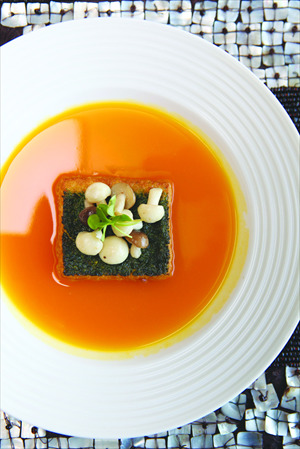
Sick of mystery meats, Beijingers are pushing for more vegetarian options. Samadhi, an all-vegetarian spot, serves this green tofu in golden soup dish. Photo: Courtesy of Samadhi
Rat meat being passed off as lamb. Thousands of dead pigs floating down the Huangpu River. Recent food scandals concerning the sub par quality of meat are enough to make even the most carnivorous think twice before chomping down.
Being vegetarian has never seemed more appetizing - or popular. As more expats look for alternatives, restaurants, holistic coaches and organic farms are rising to meet this new demand. One vegan expat, Laura Fanelli, has even been able to turn her passion for vegan cooking into a full-time job.
Fanelli, 36, has been in Beijing since 2007 and has turned her vegan lifestyle - which began with hosting dinners for groups of friends - into a career helping restaurants create vegan menus using organic, local produce. In her latest project earlier this month, she worked with Capital M on a vegan and organic menu for Food Revolution Week, an international event focused on cooking and conversing about food.
"Being vegan is definitely easy in Beijing," said Fanelli over a drink at Café Zarah in Gulou, which itself has a vast selection of vegetarian - though not always vegan - sandwiches. A newcomer to either Beijing or a vegetarian diet may not initially agree with Fanelli's assertion. But Beijing cuisine is warming up to veggie-friendly options now more than ever.
Carnivorous capital
Consuming meat in a myriad of forms, such as the venerable roasted duck, or chicken feet, pig trotters, cow intestine - really, the list goes on, often top the must-dos on the eager tourist's Beijing itinerary.
Meat is more than a novelty here, though. A diet high in meat here signifies wealth. In not-so-distant Chinese history, meat stood as a luxury and its rising prominence in Chinese cuisine has paralleled China's development. When the population hadn't yet hit 1 billion in 1980, the average Chinese ate 20 kilograms of meat a year, according to a 2008 report in the Guardian. That number spiked to 54 kilograms per person in 2007. In fact, China as a whole consumes the equivalent of 240 million cows each year.
As a result, Chinese agriculture struggles to keep up with demand.
Fanelli says the meat industry was why she decided to go vegetarian when she was 14.
"Incredible devastation happens because of the meat industry," she said. "I was ignorant about that until I started looking into becoming a vegetarian. Even if I wasn't a compassionate person, I couldn't justify it for compassionate reasons."
A lifestyle change
There are many reasons why people become vegetarians. Besides food scandals, Beijingers are also going veg for health reasons. A 2013 Oxford University study showed that a vegetarian diet reduced the risk of death or hospitalization for heart disease, as well as body mass index (BMI) figures.
Such concerns have resulted in cities like Beijing and Shanghai seeing growth in businesses that promote healthy living.
Kimberly Ashton, an Australian and food educator dubbed the "chief sprouting officer" at Sprout, a healthy-living hub in Shanghai, said many of her friends who own vegetarian restaurants have seen a recent spike in business, particularly after news about the floating pigs and rats.

Copyright ©1999-2011 Chinanews.com. All rights reserved.
Reproduction in whole or in part without permission is prohibited.